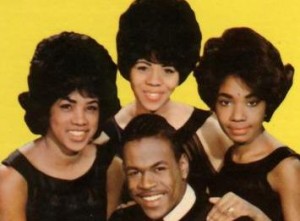This week I am seeking an answer to the age-old question — where do all the hippies meet? If you’re from Philadelphia, please don’t shout out the answer.
Audrey and the Teenettes got together in Philly in the late ’50s. The original lineup included Rosetta Hightower, Marlena Davis, and the three Brickley sisters — Audrey, Jean, and Shirley. Audrey was only 13 at the time and the mother of the Brickley girls didn’t think it was a good idea for her little girl to be singing in clubs. So Audrey left the group, and took her sister Jean with her.
The remaining trio met Stephen Caldwell when they were all classmates in high school. Caldwell was singing in a group called the Romeos, but the girls wanted him, and they got him. There was another group in school called the Cashmeres, so the quartet decided to name themselves the Orlons as a friendly first shot in the fabric wars.
Len Barry, the lead singer of the Dovells, was also a classmate. He encouraged the Orlons to audition for his label, Cameo Parkway. It took three auditions, but Cameo Parkway finally signed the group in the fall of 1961. Dave Appell was calling the shots at Cameo Parkway. He decided that Hightower should be the lead singer of the Orlons, and he began to write songs for the group to record.
At first the Orlons sang back up on two Dee Dee Sharp hits, “Mashed Potato Time,” and “Gravy (For My Mashed Potatoes). Then it was time for them to step up on their own, and they did it in a big way. Their 1962 record “The Wah-Watusi” rose to #2 on the pop chart, and later that year “Don’t Hang Up” took them to #4 on the chart. Their third, and final, big hit came when they released “South Street” and the record shot up to #3.
It’s fascinating how often we learn about groups that have enormous success early and then proceed to disintegrate. Something like that happened to the Orlons after their trio of classic hits. Davis left the group in August, 1963, and Caldwell quit the next year. Sandy Person replaced Davis, and by then the original Teenette Audrey Brickley was a few years older, so she joined the group.
Unfortunately for the Orlons, Cameo Parkway lost focus and the group’s momentum was squandered. They kept performing into the late ’60s, and had some success in the U.K. After a tour in 1968, Hightower decided to remain in England, where she went on to become a successful background singer, performing with Joe Cocker among others. Unfortunately Hightower’s departure marked the end of the Orlons.
In 1977 Shirley Brickley was shot to death in her home by an intruder. Over the years Davis and Caldwell worked a variety of day jobs until 1988, when they decided to revive the Orlons. They brought in a couple of new members and became fixtures on the oldies tour scene until Davis passed away from lung cancer in 1993. Audrey Brickley died in 2005, but the Orlons live on in the form of a group led by Caldwell and Jean Brickley.
The original voice of the Orlons, Rosetta Hightower, died in London last year. She was 70 years-old.






Comments